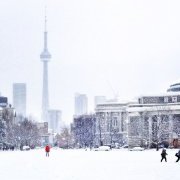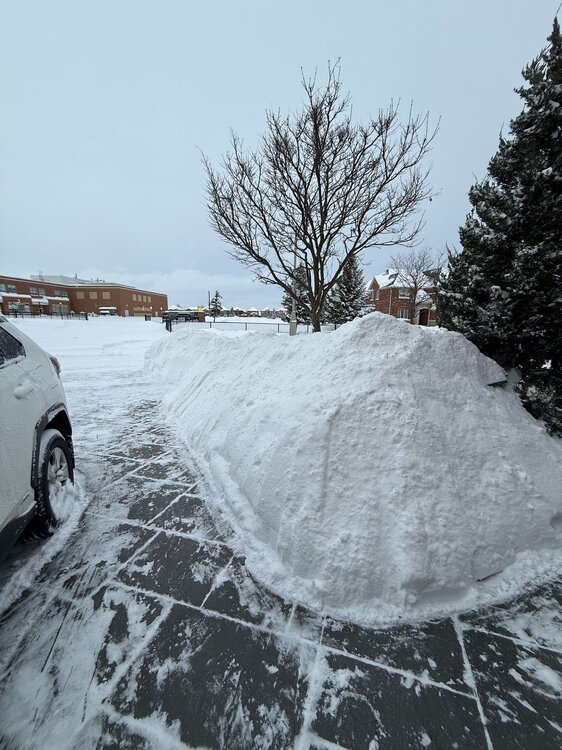-
Posts
4,111 -
Joined
Content Type
Profiles
Blogs
Forums
American Weather
Media Demo
Store
Gallery
Everything posted by Snowstorms
-
We've now gone 51 days (since Jan 1) below 41F. The longest stretch since 1985. Although this cold hasn't been extreme, its been seasonably cold since January which is something we haven't seen in a long time so I am grateful for that. YYZ will likely finish DJF right on average. This stretch is almost as remarkable as the stretch from Jan 25 to March 2, 2015 where Toronto went 37 days below freezing in a row.
-
Another footage just came out. Saw this on reddit.
-

OBS-Nowcast Noon Saturday 2/15-Noon Monday 2/17
Snowstorms replied to wdrag's topic in New York City Metro
I doubt it. From what I saw, there was skid marks under the belly and near the engines suggesting it rolled over right when it landed? There's been blowing snow all day today.- 475 replies
-
I went to go see it. Might be because of the slippery runway combined with strong winds. We got like 30" in the past 7 days and there's been a lot of blowing snow today with winds around 40mph.
-

OBS-Nowcast Noon Saturday 2/15-Noon Monday 2/17
Snowstorms replied to wdrag's topic in New York City Metro
I went to go see it shortly after it happened. We got like 30" in the past 7 days and there's been a lot of blowing snow today with winds around 40mph. From what I saw when I was there, it looked like it flipped over shortly after touching down suggesting a slippery runaway combined with strong winds. Glad everyone on board got out safe.- 475 replies
-
- 1
-

-
I drove to YYZ to check it out. There is a lot of blowing snow today thanks to the strong winds and the runway did look snow covered. The entire plane was flipped over and the fire crews were dowsing the plane when I was there. Looks like it flipped over almost right after it landed as it was right near where it would've touched down. I couldn't get a picture cause the snowbanks were too high to walk through and the blowing snow made it difficult. YYZ just opened up one of the other runways. Glad to know everyone is safe!
-
It is actually. The closest we've come in recent memory is 2014 where I had about 20" on the ground. Planning to go for a drive tomorrow when the roads clear up so will post more tomorrow. Here is my front driveway after shovelling.
-
With the storm winding down, my two day total is 11.5". My snow depth minus a little bit of compaction is now 26". Still waiting for the YYZ official numbers but it was at 10" as of 4pm.
- 711 replies
-
- 10
-

-
The GFS had this scenario a few days ago.
-
Not bad, won't complain. YYZ will likely finish with a 2 day total of 25cm (10"). Certainly not the 30-45cm (12-18") the models had for us the other day.
-
About 3" yesterday with the initial wave here. About 7" today so far with the main storm. A bit underperforming due to reasons aforementioned.
-
Light-moderate snow currently in Toronto. 2-3" seems like a good bet for today. Still a bit of model discrepancy regarding tomorrows storm, but 8-12" seems like a good early call. If the further west models are correct, we could be looking at 12-16" in Toronto. If it's slightly further east then 8-10" seems like a good bet for tomorrow.
-
Wish the Atlantic was closer so we could all experience those monster 20-30" storms the Mid Atl. or NE experience.
-
The criteria for blizzard warning is a little different in Canada than US, but we had our first blizzard warning in a long time back in Jan 2022. What a storm that was. We got 4" in an hour. Nothing quite like a blizzard, you're right.
-
Definitely in the wrong state then. Might need to join @Powerball for that.
-
12z Euro looking good for Toronto. Low isn't as amped up as the GFS/UKIE/NAM.
-
Definitely further NW than the RDPS but still SE and colder than the NAM.
-
Nam has the low over Lake Erie meanwhile RGEM is by the PA/OH border. A good 200 mile difference.
-
I prefer a healthy balance between the 3 (Nino, Nina, Neutral). Can't have one more than the other. That's why the pattern between 2000-2015 was good. PDO was negative 70% of the time and not super negative either and we had a healthy balance of 6 La Nina's, 4 neutral, and 5 El Nino's.
-
Haha took me almost 2 hours to shovel this morning. We had 2-3" on the ground before the weekend storm that dropped 6-8" and now this storm which puts us at 16" on the ground. Glad you got a snowpack again after the melting you guys experienced early Feb. What is DTW's seasonal average? YYZ is at 37" for the season now.
-
Last time we had this much on the ground was January 2022 after we got a massive storm that dumped 15-20". March 2023 came close with 12-14" but it melted quickly. We also did in Jan 2019 after a storm dumped 12-16" with a maximum snow cover of 16-18".
-
1966-67 was almost borderline La Nina on ONI and MEI. Late bloomer like this year (coldest anomalies were late winter and spring). It lead to another cold neutral-borderline La Nina the following winter. Ironically 66-67 came on the heels of a strong El Nino with a ONI peak at 2.0, much like last year. So from an ENSO perspective, 66-67 is a good analog to this year. Ironically the PDO was primarily negative for much of the 60's with few periods of positive phases here and there. Although the PDO wasn't deeply negative that decade as it has been since 2019-20. Yet ironically despite the -PDO, we saw 4 El Nino's and only one La Nina that entire decade. I certainly believe the -PDO, which is being enhanced by the extreme marine heatwave near Japan, has been amplifying the string of warm winters and to some degree the frequent La Nina's. This combined with the continuing +AMO and two strong/super El Nino's since 2015 has certainly played a role in all the warm winters. I believe a healthy balance between neutral, El Nino, and La Nina is optimal and we haven't had that since the early-mid 2010s. And ideally a weak or mod El Nino. However, statistically speaking a -PDO between -0.5 to -1.5 is more favorable for snow/cold for the NE, New England, and the Great Lakes. A deeply -PDO has to much uncertainty for all of us. A +PDO is more beneficial for the Mid-Atlantic. Though one could argue against that too. DC averaged 23" in the 1960s vs. 16" in the 80s. But they require more than just a PDO phase for snowy patterns, much more volatility down there. The 1960's were a good decade here. Featured nothing but cold winters with an average snowfall of 53". I believe Central Park averaged 30" from 1960-1970. Quite a snowy decade for you guys too. Far cry from the +PDO dominated 1980s where Central Park only averaged 20". The 2000s and early 2010's were eerily similar to the 1960's with a similar -PDO type pattern.
-
Wheres @michsnowfreak Surely his area got some snow last night.
-
Yeah I agree. That dry slot really put a damper on rates for most of us initially as the storm was beginning to form and phase.
-
Ukie has a 978mb low near Buffalo Sunday afternoon. A big hit from SE Michigan to Ontario.





